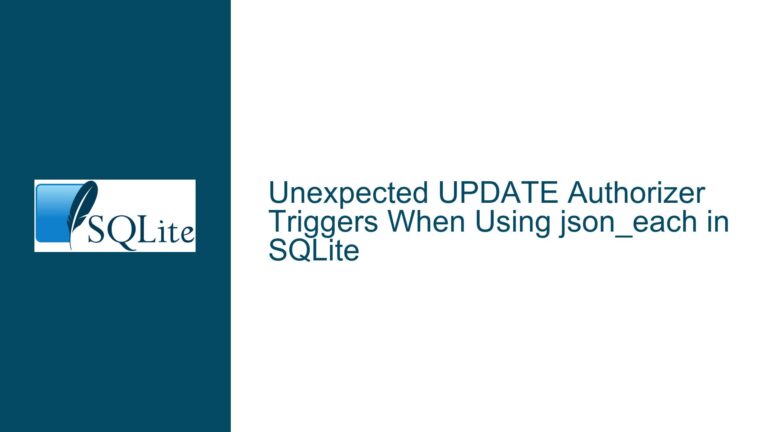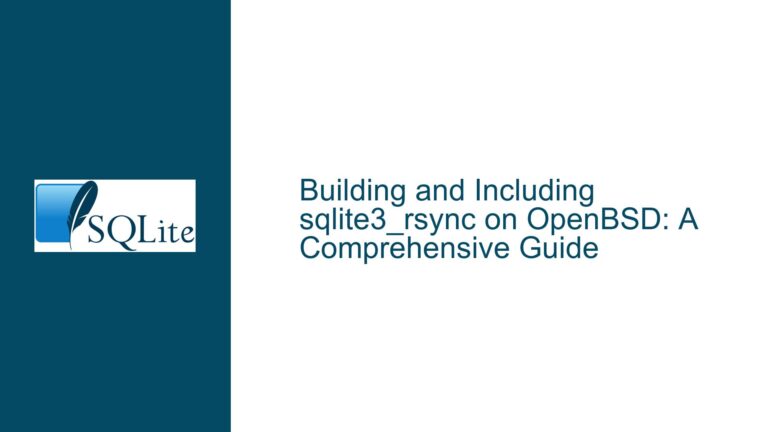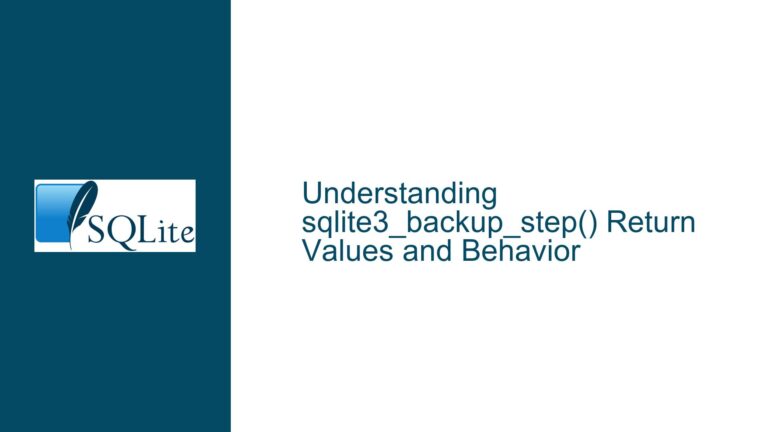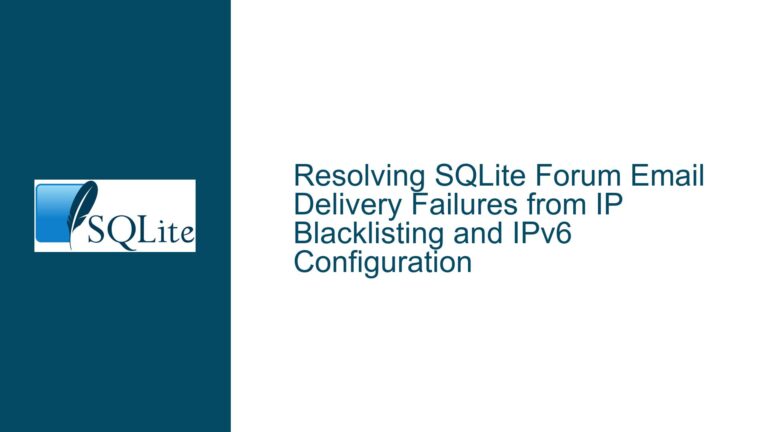SQLite Assertion `memIsValid(pRec)` Error: Causes and Fixes
Issue Overview: Understanding the memIsValid(pRec) Assertion Failure
The memIsValid(pRec) assertion failure in SQLite is a critical error that occurs during the execution of a SQL query, specifically within the sqlite3VdbeExec function. This function is part of SQLite’s virtual machine (VDBE) that executes bytecode generated by the SQLite code generator. The assertion memIsValid(pRec) ensures that the memory cell (pRec) being accessed is valid and properly initialized before any operation is performed on it. When this assertion fails, it indicates that the memory cell is either corrupted, uninitialized, or accessed in an invalid state.
The error was triggered by a specific Proof of Concept (POC) SQL query that involved a combination of SELECT DISTINCT, PRAGMA recursive_triggers, and a complex ORDER BY clause. The query was designed to stress-test the SQLite engine, and it revealed a subtle bug in the code generator. The bug was related to how SQLite handles memory cells during the execution of certain complex queries, particularly those involving recursive triggers and large ORDER BY clauses.
The POC query was executed in a custom test harness environment, which was built using gcc with SQLite’s debugging flags enabled (-DSQLITE_DEBUG). This environment allowed the assertion failure to be caught and reported, providing valuable insights into the underlying issue. The error was reproducible on Ubuntu 20.04 with a specific SQLite check-in version (bbde0f36).
Possible Causes: Why the memIsValid(pRec) Assertion Fails
The memIsValid(pRec) assertion failure can be attributed to several potential causes, each related to how SQLite manages memory cells during query execution. Below, we explore these causes in detail, focusing on the specific scenario described in the POC.
1. Memory Cell Corruption During Query Execution
One of the primary causes of the memIsValid(pRec) assertion failure is memory cell corruption. This can occur when a memory cell (pRec) is overwritten or modified in an unintended way during the execution of a query. In the context of the POC, the complex ORDER BY clause with a large number of columns could have led to an overflow or incorrect handling of memory cells. The ORDER BY clause in the POC query contains 64 columns, which is unusually large and could stress the memory management system of SQLite.
When SQLite processes an ORDER BY clause, it allocates memory cells to store intermediate results and sorting keys. If the number of columns in the ORDER BY clause exceeds the expected limit or if there is a bug in the code that handles these memory cells, it could result in memory corruption. This corruption would then trigger the memIsValid(pRec) assertion when the corrupted memory cell is accessed.
2. Uninitialized Memory Cells
Another possible cause of the assertion failure is the use of uninitialized memory cells. In SQLite, memory cells are allocated dynamically during query execution, and they must be properly initialized before use. If a memory cell is accessed before it is initialized, it could lead to undefined behavior and trigger the memIsValid(pRec) assertion.
In the POC query, the combination of SELECT DISTINCT and PRAGMA recursive_triggers could have introduced a scenario where memory cells are not properly initialized. The PRAGMA recursive_triggers statement modifies the behavior of triggers in SQLite, and if this modification is not correctly handled by the code generator, it could lead to uninitialized memory cells being accessed during query execution.
3. Code Generator Bug in Handling Recursive Triggers
The POC query explicitly involves the PRAGMA recursive_triggers statement, which enables or disables recursive trigger functionality in SQLite. Recursive triggers allow a trigger to fire other triggers, either directly or indirectly, and this can introduce additional complexity in the code generator. If there is a bug in the code generator related to handling recursive triggers, it could lead to incorrect memory cell management and trigger the memIsValid(pRec) assertion.
In the case of the POC, the bug in the code generator was identified and fixed by Richard Hipp. The bug was related to how the code generator handles memory cells when recursive triggers are enabled. The fix ensured that memory cells are properly managed and validated during query execution, preventing the assertion failure.
4. Stress Testing with Complex Queries
The POC query was designed to stress-test SQLite by combining multiple complex SQL features, including SELECT DISTINCT, PRAGMA recursive_triggers, and a large ORDER BY clause. Stress testing is a common technique used to uncover edge cases and subtle bugs in software. In this case, the POC query revealed a bug in SQLite’s memory management system that would not have been detected under normal usage scenarios.
The large ORDER BY clause in the POC query was particularly effective in exposing the bug, as it forced SQLite to allocate and manage a large number of memory cells. This stress on the memory management system, combined with the use of recursive triggers, created a scenario where the memIsValid(pRec) assertion could fail.
Troubleshooting Steps, Solutions & Fixes: Resolving the memIsValid(pRec) Assertion Failure
Resolving the memIsValid(pRec) assertion failure requires a systematic approach to identify and address the root cause of the issue. Below, we outline the steps to troubleshoot and fix the problem, based on the insights gained from the POC and the subsequent fix by Richard Hipp.
1. Reproduce the Issue in a Controlled Environment
The first step in troubleshooting the memIsValid(pRec) assertion failure is to reproduce the issue in a controlled environment. This involves setting up a test harness similar to the one used in the POC, with SQLite’s debugging flags enabled (-DSQLITE_DEBUG). The test harness should include the POC query and any additional queries that may help isolate the issue.
To reproduce the issue, follow these steps:
Step 1: Download and build SQLite from the specific check-in version (
bbde0f36) mentioned in the POC. This ensures that the environment matches the one where the issue was originally observed.Step 2: Compile SQLite with debugging flags enabled. Use the following command to build SQLite with the necessary flags:
gcc -o harness test/ossfuzz.c test/ossshell.c sqlite3.c -ldl -pthread -DSQLITE_DEBUGStep 3: Execute the POC query using the test harness. The POC query should be executed in a controlled environment where the assertion failure can be observed and logged.
Step 4: Analyze the output and logs generated by the test harness. Look for any error messages or assertions that indicate a problem with memory cell management.
2. Identify the Root Cause of the Assertion Failure
Once the issue has been reproduced, the next step is to identify the root cause of the memIsValid(pRec) assertion failure. This involves analyzing the SQLite source code, particularly the sqlite3VdbeExec function and the code generator, to understand how memory cells are managed during query execution.
Step 1: Examine the
sqlite3VdbeExecfunction in the SQLite source code. This function is responsible for executing the bytecode generated by the SQLite code generator. Look for any code paths that involve the allocation, initialization, and validation of memory cells.Step 2: Focus on the code that handles the
ORDER BYclause and recursive triggers. These are the key components of the POC query that likely contributed to the assertion failure. Look for any potential issues, such as uninitialized memory cells or incorrect handling of recursive triggers.Step 3: Use debugging tools, such as
gdb, to step through the execution of the POC query. This will allow you to observe the state of memory cells at various points during query execution and identify where thememIsValid(pRec)assertion fails.Step 4: Compare the behavior of the faulty code with the fixed version provided by Richard Hipp. This will help you understand the specific changes that were made to resolve the issue and ensure that memory cells are properly managed.
3. Apply the Fix and Validate the Solution
After identifying the root cause of the assertion failure, the next step is to apply the fix and validate that it resolves the issue. The fix provided by Richard Hipp addressed a bug in the code generator related to handling recursive triggers and memory cell management.
Step 1: Apply the fix to the SQLite source code. The fix should be applied to the specific version of SQLite where the issue was observed (
bbde0f36). Ensure that the fix is correctly integrated into the codebase and does not introduce any new issues.Step 2: Rebuild SQLite with the applied fix. Use the same compilation command as before, with debugging flags enabled:
gcc -o harness test/ossfuzz.c test/ossshell.c sqlite3.c -ldl -pthread -DSQLITE_DEBUGStep 3: Re-run the POC query using the test harness. Verify that the
memIsValid(pRec)assertion no longer fails and that the query executes successfully.Step 4: Perform additional testing to ensure that the fix does not introduce any regressions. This includes running a suite of test queries, including those that involve recursive triggers and complex
ORDER BYclauses, to validate that memory cells are properly managed in all scenarios.
4. Implement Best Practices to Prevent Future Issues
To prevent similar issues from occurring in the future, it is important to implement best practices for memory management and query execution in SQLite. These practices include:
Best Practice 1: Always initialize memory cells before use. Ensure that all memory cells allocated during query execution are properly initialized to avoid accessing uninitialized memory.
Best Practice 2: Validate memory cells before accessing them. Use assertions and debugging tools to validate that memory cells are in a valid state before performing any operations on them.
Best Practice 3: Test complex queries thoroughly. Use stress testing and fuzz testing to uncover edge cases and subtle bugs in the code generator and memory management system.
Best Practice 4: Monitor and review code changes. Regularly review changes to the SQLite codebase, particularly those related to memory management and query execution, to ensure that they do not introduce new issues.
By following these troubleshooting steps and implementing best practices, you can effectively resolve the memIsValid(pRec) assertion failure and ensure that SQLite operates reliably in all scenarios.






